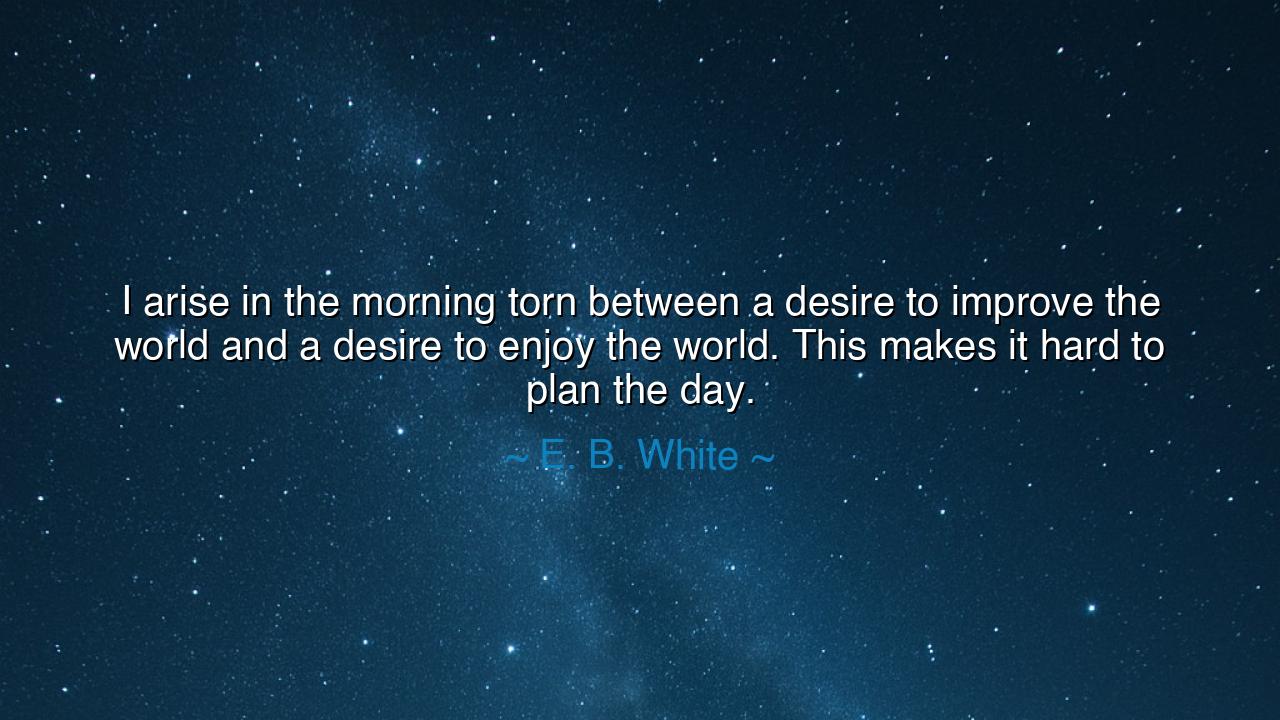
I arise in the morning torn between a desire to improve the world
I arise in the morning torn between a desire to improve the world and a desire to enjoy the world. This makes it hard to plan the day.






“I arise in the morning torn between a desire to improve the world and a desire to enjoy the world. This makes it hard to plan the day.” – E. B. White
In this gentle yet profound reflection, E. B. White, the beloved author of Charlotte’s Web and Stuart Little, captures the eternal conflict of the human heart: the tension between duty and delight, between the longing to improve the world and the longing to enjoy it. His words, laced with humility and humor, reveal not only the writer’s daily struggle, but the condition of all souls who are both dreamers and doers. In this single sentence, White confesses what philosophers have debated for ages—that the moral life and the joyful life often pull us in opposite directions, and wisdom lies in learning how to balance the two.
The origin of this quote springs from White’s own life of reflection and simplicity. Living in a small farmhouse in Maine, he spent his days writing, tending animals, and observing the quiet rhythm of nature. Though he lived far from the chaos of cities and politics, he was never indifferent to the world’s suffering. His essays spoke of justice, kindness, and the fragile beauty of civilization. Yet he also loved life’s small pleasures—the smell of hay, the laughter of children, the song of birds at dawn. When he said, “This makes it hard to plan the day,” it was with the bittersweet smile of one who understands that conscience and contentment often dwell in the same heart, but do not always walk in step.
To improve the world is a noble calling. It demands sacrifice, discipline, and constant vigilance. It asks us to look beyond our own comfort, to lift the burdens of others, to speak for those without a voice. But to enjoy the world is no less sacred—it is to honor the gift of life itself, to see beauty in imperfection, to taste joy even in fleeting moments. White’s wisdom lies in reminding us that both are necessary. If we strive only to improve the world, we risk bitterness and exhaustion. But if we live only to enjoy it, we drift into selfishness and neglect. The true art of living is to let both desires feed one another—to let love of life give birth to service, and service deepen our love of life.
Consider the life of Mahatma Gandhi, who embodied this delicate balance. He devoted his life to justice and freedom, bearing immense suffering to improve the condition of his people. Yet in the midst of struggle, he found joy in the simplest things—in spinning his wheel, in silence, in prayer. His laughter was soft but radiant; his peace, unshakable. Like White, he knew that to improve the world without enjoying it is to lose sight of what we are fighting for, and to enjoy it without improving it is to betray the gift of conscience. The harmony of both—joy and justice—is the rhythm of a full and meaningful life.
White’s confession also carries a tender humor, for it reminds us that such balance is never easy. Each morning, we rise, as he did, with conflicting callings tugging at our hearts. Should we rush to work or linger over the sunrise? Should we strive for progress or pause for gratitude? The modern world magnifies this struggle, urging us always to achieve, yet rarely to simply be. But in acknowledging this tension with grace, White teaches us to forgive ourselves—to see our indecision not as failure, but as evidence of a heart still alive, still feeling, still human.
The lesson of this quote is that we must not choose one side and reject the other, but learn to weave both into the fabric of our days. The world needs our labor, yes—but it also needs our laughter. It needs builders and dreamers, reformers and poets, warriors and lovers of quiet beauty. To live well is to rise each morning ready to serve and to savor—to plant trees that will outlive us, and to sit beneath their shade while we still can.
So, my child of morning and meaning, remember this: let your desire to improve never extinguish your ability to enjoy, and let your joy never blind you to the needs of others. Begin each day as E. B. White did—with an open heart, torn between love for the world as it is and hope for the world as it could be. For it is in that very tension, in that tender impossibility, that life becomes both holy and human—and worth rising for, every morning.






AAdministratorAdministrator
Welcome, honored guests. Please leave a comment, we will respond soon